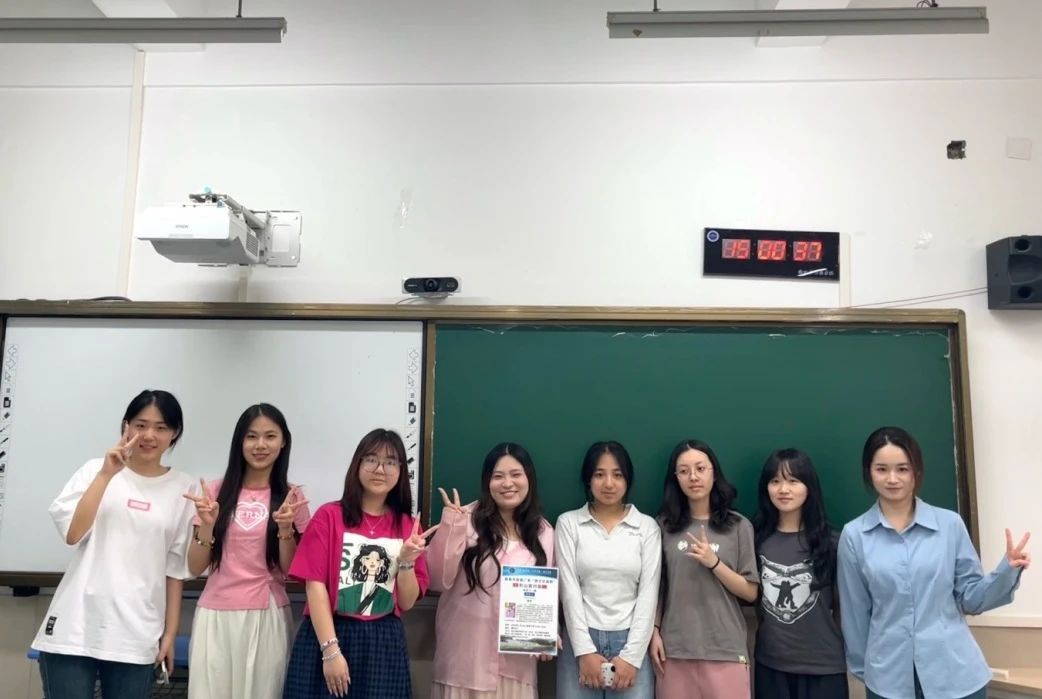为了进一步了解和关心国际留学生在校学习和生活情况、增进对中外大学生所在的国家文化的认识、培养学生国际视野、促进文化交流和文明沟通,国际学院推出了教育开放推广季“跨文化视野”之“和山面对面”系列访谈节目。4月10日下午东方语言文化学院韩语专业的韦覃曦同学对清闲进行了访谈。
清闲,来自越南,一名2024级汉语语言文化专业的学生。
Thanh Nhàn,From Vietnam, is a student majoring in Chinese language and culture in the class of 2024.
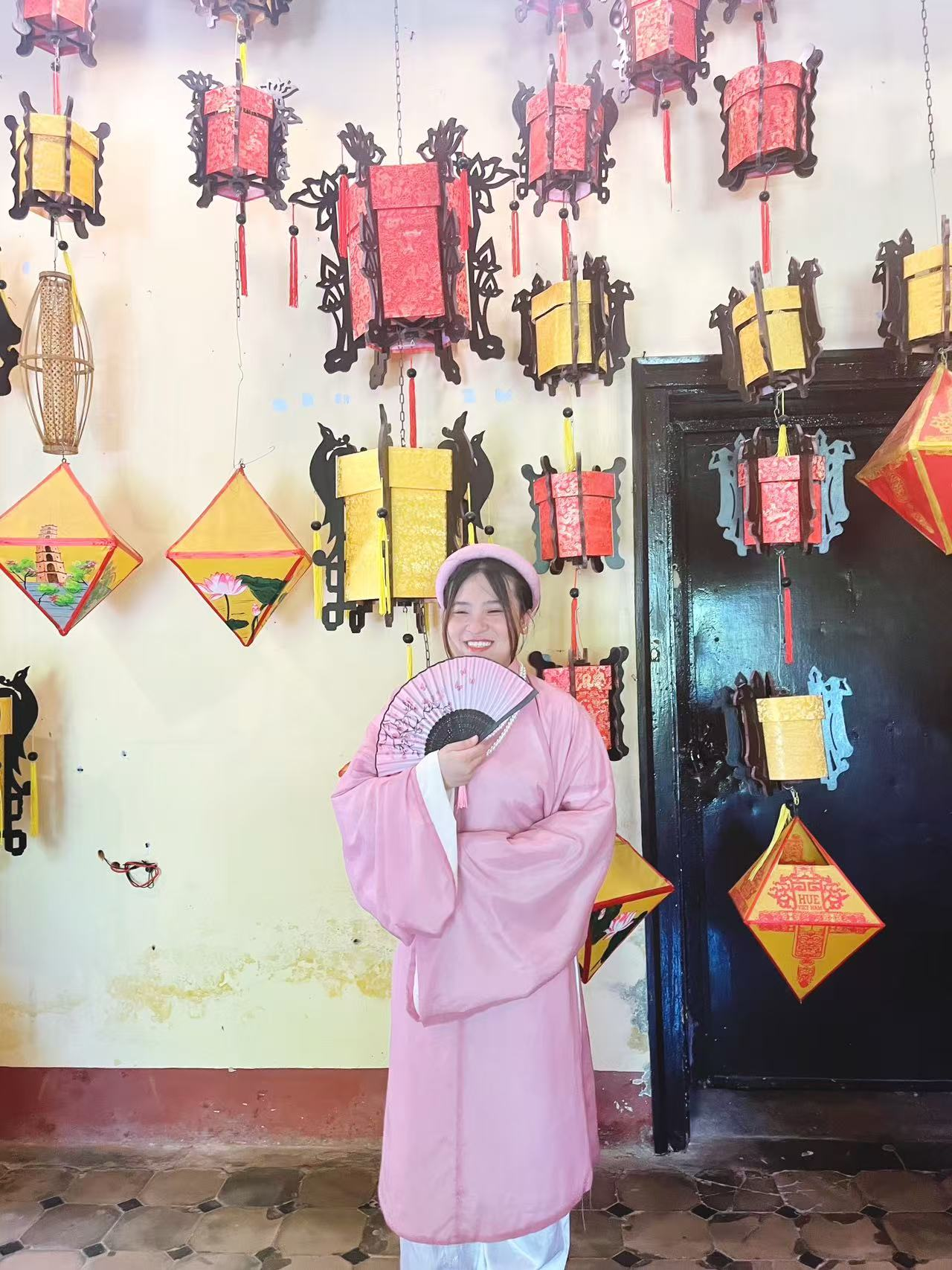
1. 韦覃曦:从之前聊天开始,我就很期待和你的这次见面啦!你的中文真的说的太好了,可以和我们分享一下是怎么开始学习和怎么学习的吗?
清闲:其实我是因为追星,高中开始就喜欢王俊凯了,但是一开始没有特意的去学习中文,只是很喜欢听歌。上大学之后我们本科是需要用法语和英语学习的,毕业要求里又需要再学一门语言,所以我就选择了中文。开始学习的时候我的听力和口语都比较好,但是写作和字迹就一般,但是我想来中国留学嘛,所以我就找了一个一对一的老师学习读写,系统的学习了将近一个月,然后就成功考到了HSK4级,而且很开心的是我的听力拿到了满分。
Wei Qinxi: I've been looking forward to meeting you since we chatted before! Your Chinese is really good, can you share with us how to start learning and how to learn? Thanh Nhàn: In fact, I like Karry Wang since high school because of chasing stars, but I didn't go out of my way to learn Chinese at the beginning. I just like listening to songs a lot. After going to college, we need to study in French and English as undergraduates, and we need to learn another language in the graduation requirements, so I chose Chinese. At the beginning of my study, my listening and speaking were quite good, but my writing and handwriting were ordinary. But I wanted to study in China, so I found a one-to-one teacher to learn reading and writing. I studied systematically for nearly a month, and then I succeeded in getting HSK4, and I was very happy that my listening got full marks.
2. 韦覃曦:可以为我们介绍一下你的家乡胡志明市吗?
清闲:胡志明市位于越南南部,是一个较为商业和工业化的城市,感觉和上海的感觉很相似。如果是想要体验文化和历史传统的话,我会推荐你们去首都河内。那边很好的保留了大量的历史建筑和景色。
Wei Qinxi:Could you tell us about your hometown, Ho Chi Minh City?
Thanh Nhàn: Ho Chi Minh City is in southern Vietnam,it's pretty commercial and industrial, kinda gives off Shanghai vibes. But if you're looking for culture and traditional history, I'd totally recommend Hanoi, the capital. It’s got way more preserved historical buildings and scenery.
3. 韦覃曦:越南的传统服饰是什么样的呢?
清闲:像我照片里穿的这种是叫“Áo tấc ”(奥塔克),这个衣服的年代有些久远了,有着宽松而且较大的袖子,与长裤搭配,从脖子到膝盖下都会全部遮住,领子是挺立的。整件衣服会由五块布料制成,是阮朝(NguyenDynasty)以后的正式服饰。一般会在比较重要的活动穿,比如婚礼和礼拜活动。还有一种很常见的是“Áo dài ”(奥黛),是越南的国服。
韦覃曦:我有看过奥黛的图片,感觉和中国的旗袍有一点像,具体来说奥黛是什么样的衣服呢?
清闲:奥黛的上半身和旗袍是有些类似的,上半身是紧身的,并且整体的衣服会长至脚裸,从腰部开叉。一般里面我们会搭配一条白色的阔脚长裤。而且奥黛还是越南学生的校服,但是只有女学生穿,做校服的时候,奥黛通常以白色为主。男生的校服的话就没有很固定的要求。
Wei Qinxi:What do traditional Vietnamese clothes look like?
Thanh Nhàn: The one I’m wearing in my photo is called "Áo tấc" (pronounced like "Ao tac"). It’s a pretty old-style outfit with loose, wide sleeves, usually paired with long pants. It covers everything from the neck down to below the knees and has a stiff, standing collar. The whole thing is made from five separate pieces of fabric and was the formal wear during the Nguyễn Dynasty. People usually wore it for important events like weddings or ceremonies. Another really common one is the "Áo dài" (Ao dai), Vietnam’s national dress.
Wei Qinxi: I’ve seen pictures, it looks a bit like the Chinese "qipao". What exactly does an “áo dài” look like?
Thanh Nhàn: The top half is somewhat similar to a *qipao*—fitted and snug, but the whole dress goes down to the ankles and splits at the waist. We usually wear it with loose white pants underneath. Oh, and the“áo dài”is actually the school uniform for Vietnamese students, but only for girls. The school version is usually plain white. For boys, there’s no strict uniform requirement.
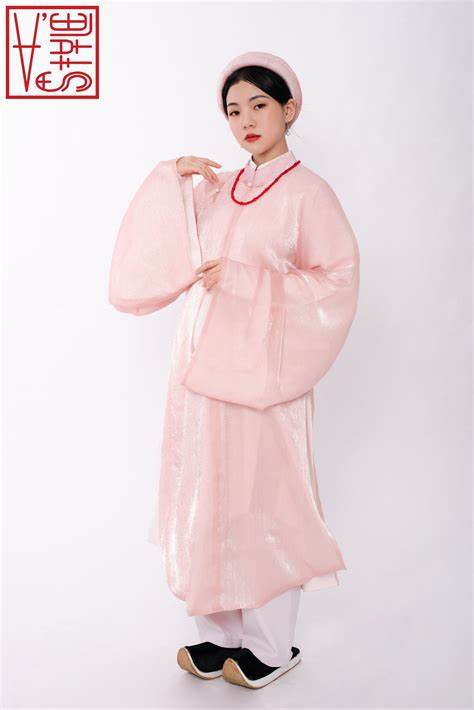
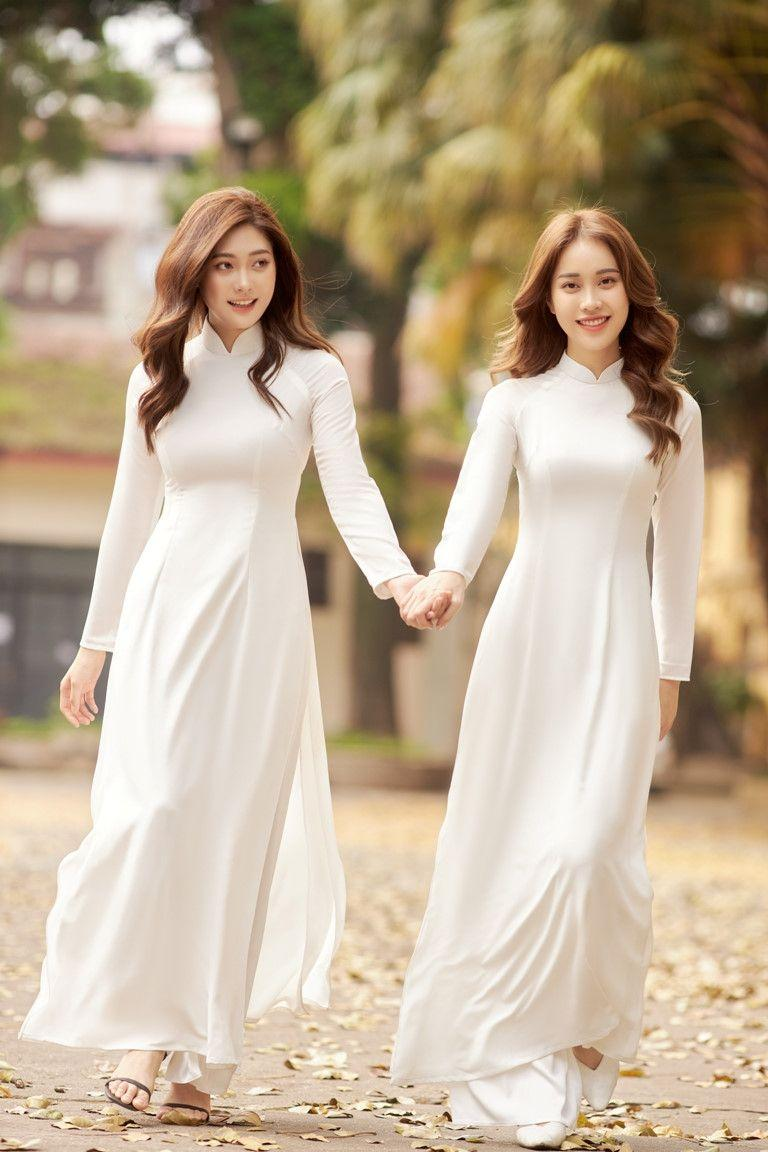
4. 韦覃曦:现在的话一般什么时候大家会穿这些较为传统的服饰呢?
清闲:有的,比如这几天在胡志明就有一种活动叫“百花步行”,大家会穿着各种各样的古装服饰在街道上走,大家既有机会看到不一样的传统服饰,也有机会自己体验。
Wei Qinxi:When do people usually wear these more traditional outfits nowadays?
Thanh Nhàn: For example, these days in Ho Chi Minh City, there’s an event called "Bách Hoa Hành", where people dress in various historical costumes and parade through the streets. It’s a great chance to see different traditional outfits and even try them out yourself.

5. 清闲:最近我们的“解放日”也要到了,是4月30日。这是为了庆祝我们南部和北部的统一,一般会和劳动节一起放假的。
韦覃曦:这个节日会有什么样的庆祝活动吗?
清闲:我记得中国有很多活动都会放烟火庆祝,但是在越南人们是不允许放烟花的。只有在解放日或者过年的时候政府会放烟花,那时候也会有灯光秀表演。
韦覃曦:原来是这样,为什么不可以放烟火呢?
清闲:首先可能是因为我们面积比较小,大家的距离都比较近,所以担心放烟火会不太安全。以前还没有那么严格的,在我爸爸妈妈那个年代,那时候人口也没有现在那么多。但是现在就比较严格的规定了不可以放。所以我觉得特别神奇的就是我今天在中国体验了很多不一样的烟花。过年的时候我就继续待在了中国,然后就觉得很惊讶因为连续几天都可以放烟火,还可以玩烟火到凌晨三四点,玩的特别开心。
Thanh Nhàn: Our Reunification Day is coming up soon , it's on April 30th. This holiday commemorates the reunification of North and South Vietnam, and it's usually combined with Labor Day for an extended holiday period.
Wei Qinxi: What kind of celebratory activities are held for this holiday?
Thanh Nhàn: I know in China many celebrations feature fireworks, but in Vietnam we're not allowed to set them off privately. Only the government organizes fireworks displays during special occasions like Reunification Day or New Year, accompanied by spectacular light shows.
Wei Qinxi: I see. Why are fireworks not allowed?
Thanh Nhàn: The main reason is probably because Vietnam is relatively small and densely populated, making fireworks potentially unsafe. It wasn't so strict in my parents' generation when the population was smaller. But now the regulations are much tighter.That's why I found it absolutely amazing to experience Chinese New Year in China - I was so surprised that people could set off fireworks for several days in a row, even until 3 or 4 in the morning! I had an incredible time playing with fireworks there.
6. 韦覃曦:那在中国的这段时间,你还有体验哪些和越南不太一样的文化吗?
清闲:婚礼的文化也很不一样哈哈哈,我记得我和朋友去过几次,我发现新郎接亲的时候,都只接新娘一个人,但是在越南是会把女方一家人都接走的。还有中国婚礼吃席的时候会有很多很多菜,当时我看到服务员哪怕桌上没位置了都还在上菜的时候十分惊讶。我在想真的可以吃完吗,因为在越南不会有那么多菜,我们会按每桌的人数来上菜,吃完一样菜才会继续上下一份,或者以火锅的形式来招待大家,还有的话就是按西方的形式,每人一份,定量上菜。所以大家来参加婚礼是基本不会吃太饱的,但是在中国的话就会很多菜,吃不完居然还可以打包带走。
Wei Qinxi: During your stay in China, what other cultures have you experienced that are different from Vietnam?
Thanh Nhàn: The culture of the wedding is also very different. I remember I went there several times with my friends. I found that when the groom picked up the bride, he only picked up the bride, but in Vietnam, the bride's family would be picked up. There are many dishes at the Chinese wedding banquet, and I was surprised to see that the waiters were still serving food even though there was no place on the table. I wonder if we can really finish it, because there are not so many dishes in Vietnam. We will serve the dishes according to the number of people at each table. After eating one dish, we will continue to serve the next one, or in the form of hot pot, or in the form of the West, one for each person, and ration the dishes. So you won't eat too much when you come to the wedding, but in China, there will be a lot of food, and you even can take it away if you can't finish it.
7. 韦覃曦:越南的文化符号也很多,其中越南河粉也是非常出名的,河粉是什么样的食物呢?
清闲:啊没错,在越南,河粉和北京烤鸭在中国的地位差不多,很有名。这个南北方的配料稍微有点不一样,但是基本的食材都是差不多的,汤底一般会用牛骨熬制十几个小时,加上牛肉,豆芽,青菜这样的配菜做成。而且一般一碗粉里配菜会比粉更多,肉会放很多,不会只卖粉,如果有机会来越南的话,真的很推荐你们去尝试。
韦覃曦:真的很想试试看正宗的越南河粉,还有什么其他的美食吗?
清闲:还有一种猪肉做的美食,叫小肠卷,里面用肉泥做成的,非常美味。还有我们的奶茶也非常值得尝试,尤其是我们的珍珠里面会放水果和奶酪,非常有嚼劲,
Wei Qinxi: Vietnam has many cultural icons, and pho is particularly famous. What kind of food is pho exactly?
Thanh Nhàn: Oh yes! In Vietnam, pho holds a similar status to Peking duck in China - it's that iconic! While the toppings vary slightly between the north and south, the basic ingredients remain the same. The broth is typically simmered for over ten hours using beef bones, then served with rice noodles, beef, bean sprouts, and fresh herbs. What's special is that the toppings usually outnumber the noodles - we're generous with the meat! If you ever visit Vietnam, you really must try authentic pho.
Wei Qinxi: I'd love to try real Vietnamese pho! Any other must-try dishes?
Thanh Nhàn: Definitely! There's this amazing pork dish called "nem lụi" - grilled pork sausage rolls with a delicious meat paste filling. And our bubble tea is worth trying too! Unlike regular pearls, we often add fruit and cheese to the pearls, making them extra chewy and flavorful.
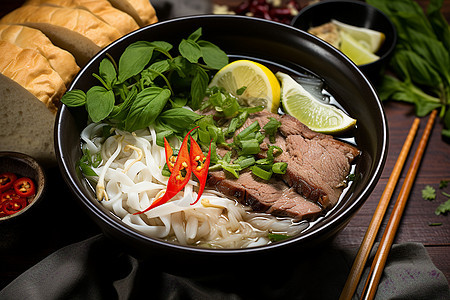
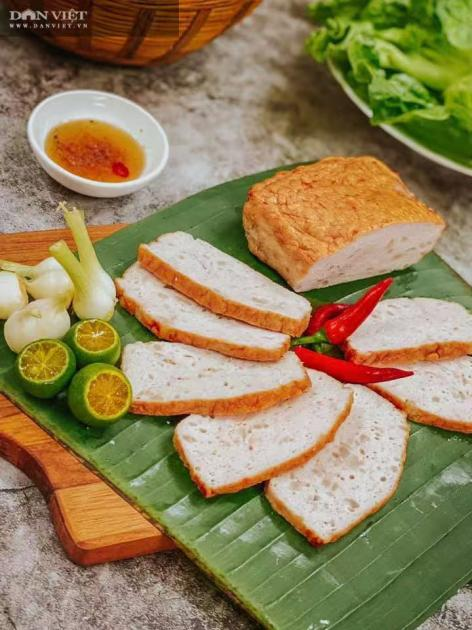
8. 韦覃曦:越南也有很多有名的咖啡品牌,有哪些是非常推荐的吗?
清闲:有的,“highland”咖啡就是我们本地一个连锁的咖啡店,非常值得一试。还有“Phuc Long ”也是很有名的老字号咖啡厅。
韦覃曦:可以再和我们说说去越南旅游的话有没有推荐的很值得去尝试的活动或者玩的地方呢?
清闲:去海边是非常推荐的,本地人也经常去哈哈哈,海水很清澈也很漂亮。而且一般去海边的话会有一个很大的船,可以在那里体验抓海然后直接烹饪来吃,非常有意思。
Wei Qinxi: Vietnam has many famous coffee brands. So which ones would you particularly recommend?
Thanh Nhàn: Absolutely! "Highlands Coffee" is our most popular local chain that's definitely worth trying. Another great choice is "Phuc Long Coffee" - it's a well-established brand with a long history.
Wei Qinxi: Could you also recommend some must-try activities or places to visit in Vietnam?
Thanh Nhàn: I highly recommend visiting our beaches! (laughs) Even locals love going there, the water is incredibly clear and beautiful. A really unique experience is boarding one of the large fishing boats where you can catch seafood and have it cooked fresh right on board. It's super fun and delicious!
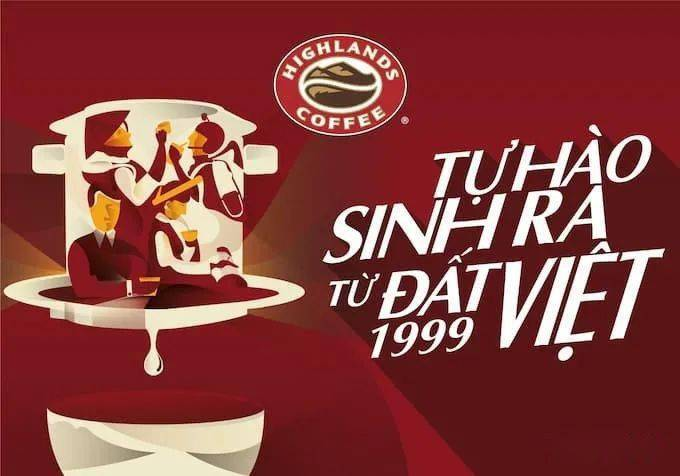

9. 韦覃曦:来浙外学习之后有什么不一样的感觉吗?
清闲:一开始觉得学校离市中心好像有点远哈哈哈。还有一开始会觉得中国同学走路都好快,而且都不会感到累的样子,因为我在越南的时候出门一般都是骑摩托车或者开车,不会走很久的路,来中国之后我第一次一天之内走了一万步。而且在中国感觉很多时候如果不是太远的距离大家都会选择步行。
韦覃曦:可以和我们说说本学期还有什么想尝试的事情或者期待的活动吗?
清闲:很期待去旅游!我很想等我家人来了之后和他们一起去乌镇玩。还有成都和重庆哈哈哈哈,那边的火锅和奶茶店都很想打卡一下。
Wei Qinxi: What do you feel after coming to ZISU? Any noticeable differences?
Thanh Nhàn: At first, I thought our campus was kinda far from downtown (laughs). Also, I was amazed by how fast Chinese students walk , like they never get tired! Back in Vietnam, we usually ride motorbikes or drive even for short distances. But here? I hit 10,000 steps in a single day for the first time! It's interesting how people here prefer walking for moderate distances.
Wei Qinxi: What are you looking forward to this semester? Any plans or activities?
Thanh Nhàn: I'm super excited about traveling! I really want to visit Wuzhen with my family when they come. And Chengdu! And Chongqing! (laughs) I'm dying to try their famous hotpot and check out all the trendy bubble tea shops there.
